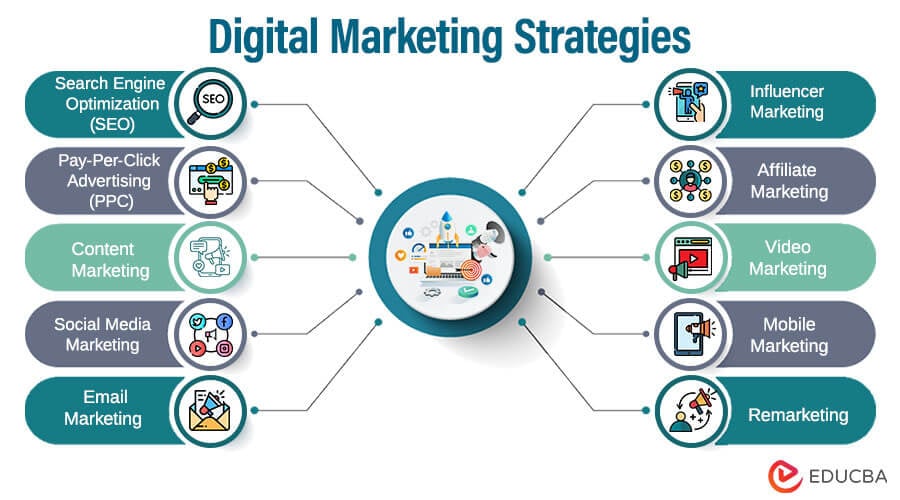What Digital Marketing Strategy?
In today’s digital age, the question on every business’s mind is, “What digital marketing strategy should we implement?” With the ever-evolving landscape of online marketing, it’s crucial to craft a strategy that not only keeps pace but stays ahead of the curve. This article will delve into the comprehensive world of digital marketing strategies, providing insights and actionable tips to help you achieve your business goals.
Digital Marketing Strategy for Business
Digital marketing encompasses all marketing strategies and techniques executed through digital channels to reach and engage customers. It’s the key to unlocking your target audience’s potential and driving business growth. Embracing a well-defined digital marketing strategy allows you to:
- Connect with your customers where they are – online
- Personalize your marketing efforts for greater impact
- Measure and track your results to continuously improve
- Stay ahead of your competitors and adapt to market trends
Developing a comprehensive digital marketing strategy involves a comprehensive approach that encompasses a wide range of channels and tactics. Let’s explore each aspect in detail:
Content Marketing:
Content marketing is the cornerstone of any effective digital marketing strategy. It involves creating and distributing valuable, relevant, and consistent content to attract and engage your target audience. By providing informative and engaging content, you can establish yourself as a thought leader in your industry, build trust, and drive traffic to your website. Content marketing encompasses a variety of formats, including blog posts, articles, videos, infographics, and social media updates.
To create effective content, start by understanding your audience’s interests and needs. Conduct thorough research to identify their pain points and aspirations. Tailor your content to address their specific challenges and provide solutions that resonate with them. Remember, consistency is key – regularly publishing high-quality content will keep your audience engaged and coming back for more.
When it comes to promoting your content, leverage the power of social media. Share your content across multiple platforms and engage with your audience through comments, replies, and live Q&A sessions. Consider using social media advertising to reach a wider audience and target specific demographics.
Email marketing remains a highly effective way to nurture your audience and drive conversions. Build an email list by offering valuable content or incentives in exchange for their contact information. Craft compelling email campaigns that provide tailored content, promotions, and updates. Personalize your emails by addressing recipients by name and segmenting your list based on their interests or demographics.
Search engine optimization (SEO) is a crucial element of your digital marketing strategy. It involves optimizing your website and content to rank higher in search engine results pages (SERPs) for relevant keywords. By improving your website’s visibility and organic traffic, you can attract potential customers who are actively searching for products or services like yours.
To enhance your SEO, start by conducting thorough keyword research to identify the terms your audience is searching for. Optimize your website’s content, including page titles, headings, and meta descriptions, to include these keywords. Additionally, build high-quality backlinks from authoritative websites to increase your website’s credibility and relevance. By following SEO best practices, you can improve your organic reach and drive more qualified traffic to your website.
What Digital Marketing Strategy Should You Use?
In today’s competitive digital landscape, businesses need to adopt a sound digital marketing strategy to stand out. With countless options available, it can be overwhelming to decide which tactic will best drive results. This guide provides an overview of essential digital marketing strategies to help you make an informed decision.
Search Engine Optimization (SEO)
SEO involves optimizing website content and structure to improve its ranking in search engine results pages (SERPs). By using relevant keywords, creating high-quality content, and building backlinks, businesses can enhance their visibility and attract more organic traffic. SEO is a long-term strategy that requires consistent effort and optimization, but it can yield significant results over time.
Content Marketing
Content marketing focuses on creating and distributing valuable, informative, and engaging content to attract and retain a clearly defined audience. It involves developing blog posts, articles, infographics, videos, and other forms of content that provide solutions to customers’ problems or fulfill their interests. By establishing yourself as a thought leader in your industry, you can build trust, generate leads, and drive conversions.
Social Media Marketing
Social media platforms offer a powerful channel to connect with your target audience, build relationships, and drive traffic to your website. By creating engaging content, running targeted ads, and leveraging social listening tools, businesses can increase brand awareness, generate leads, and drive sales. Social media marketing is particularly effective for reaching younger audiences and building a loyal community.
Email Marketing
Email marketing remains a cost-effective and highly targeted channel for reaching customers. By building an email list, businesses can send personalized messages to their subscribers, promote products or services, and drive website traffic. Email marketing campaigns can be automated to deliver targeted messages based on customer behavior, ensuring that the right message is delivered to the right person at the right time.
Paid Advertising
Paid advertising allows businesses to reach a specific audience with targeted ads on search engines, social media platforms, and other websites. Pay-per-click (PPC) campaigns enable businesses to pay only when users click on their ads, making it a cost-effective way to drive traffic to specific landing pages or website sections. Paid advertising is particularly effective for short-term campaigns and generating immediate results.
